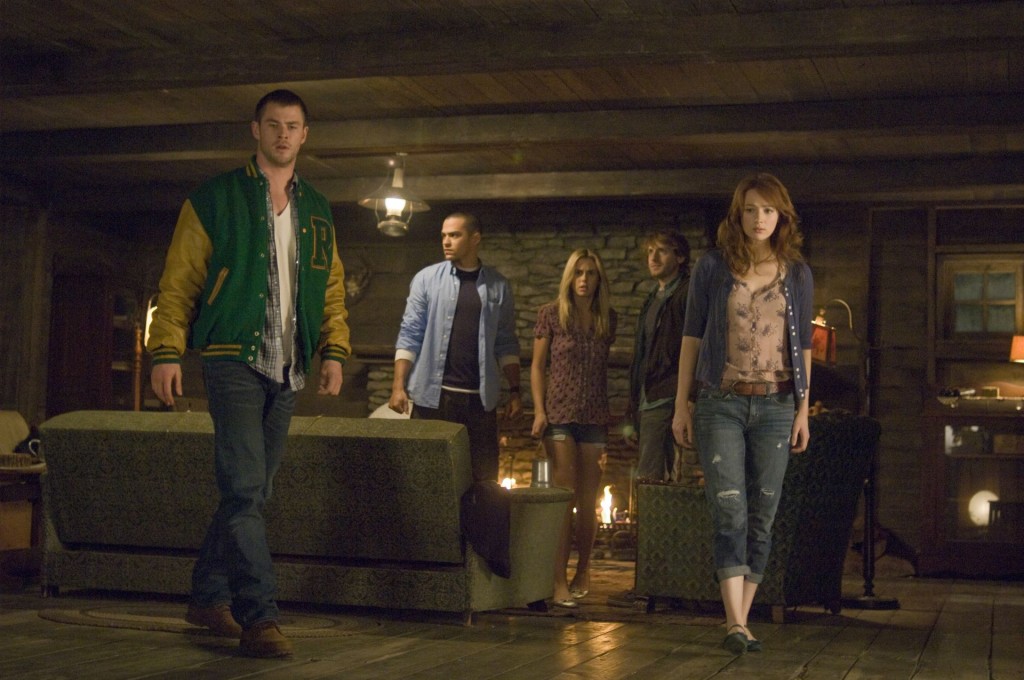Review: The Cabin in the Woods (2012)
It’s really hard to discuss a film like The Cabin in the Woods without spoiling major plot developments, so I’ll keep this review short.
Written by Joss Whedon (Buffy the Vampire Slayer) and Drew Goddard (Cloverfield), who also directed, The Cabin in the Woods is a horror comedy that takes horror genre conventions and skewers them mercilessly and hilariously. It is intended as a knowing satire of the often-defunct genre of horror, but also as an exploration of why audiences demand to watch people butchered in such horrific ways for their own enjoyment. It likens such audience demands to ancient tribal sacrifices.
The plot riffs on classic horror movies like The Evil Dead, with five friends heading out to a cabin in the woods for the weekend. However, the characters are merely pawns in some kind of elaborate scheme controlled by two operators (Richard Jenkins and Bradley Whitford), who manipulate the events at the cabin in order to assure the situation turns into a horror movie. With this meta-horror movie setup, the operators are allowed almost complete control of the situation, opening up the possibilities for what happens onscreen. As well, this setup very deliberately turns the film into a discussion of the creation of horror movies themselves and the demands of the horror movie audience.
The characters fit into the five molds that most slasher films utilize: the jock (Chris Hemsworth), the slut (Anna Hutchison), the scholar (Jesse Williams), the stoner (Fran Kranz) and the virgin, or last girl (Kristen Connolly). Although the film goes to lengths to describe why the characters fit such archetypes, it would’ve been nice to see them developed into deeper characters, but that isn’t necessary for the intentions of the film. I think it’s on purpose that the two operators are the best and funniest characters in the film.
The best part of The Cabin in the Woods is the humour. This is a funny film — far funnier than it is scary. I would’ve preferred if Whedon and Goddard had been able to make all their comments on the horror genre within a film that was actually scary, but this likely wasn’t their intention and shouldn’t be held against them.
The film has plenty of clever references to other horror movies like the abovementioned Evil Dead. The ending of the film opens up even wider possibility for references. It’s also the best part of the film — a rarity for a horror film, since most horror movies seem to decline in quality after their first act. There is a sequence with a unicorn that is the funniest thing I’ve seen in a movie this year.
The biggest problem the film has is its commentary on why we watch horror movies. While Whedon and Goddard seem to believe they have figured out the reason audiences demand the sacrifice of young innocents on film, I found the reasons provided unsatisfactory and simplistic. In short, I don’t necessarily agree with their take on horror movies, although I can appreciate how they work their understandings into the fabric of the plot itself.
These quibbles aside, the film is largely a success, with some smart humour, a keen understanding of horror movie conventions, a crisp running time (95 minutes), and a great ending. If you love horror movies but are getting a little sick of the formula, The Cabin in the Woods is for you.
7 out of 10
The Cabin in the Woods (2012)
Directed by Drew Goddard; written by Joss Whedon and Drew Goddard; starring Kristen Connolly, Fran Kranz, Chris Hemsworth, Jesse Williams, Anna Hutchison, Richard Jenkins, and Bradley Whitford.
The following is a short discussion of the conversation surrounding the film rather than the film itself, and as such, it doesn’t really belong in the review proper:
The Cabin in the Woods is extremely clever, very entertaining, but in some ways seems to be a conflicted satirizing of genre, or even more so, genre fandom. For a film that seems so intent on indicting horror movie fans, it seems to have acquired a perverse fanboy following.
This is far more a criticism of the conversation surrounding the film than the film itself, but when so many people are hailing The Cabin in the Woods as a reinvention of horror or a love-letter to horror movie fans, I find the real intentions of the film are being obscured. However fun all the horror movie references are, and however much Whedon and Goddard demonstrate that they understand the beats of a horror movie and know how to mess with the formula, the film does not seem to be a love letter to horror movies or a desire to reinvent them. Shallowly referencing other horror movies does not equal deconstructing them. As well, the satire is harsher than audiences seem to get. Overall, the film is hardly a horror film. It’s a satire, first and foremost, and audiences need to understand that.
A film that similarly plays with horror movie conventions for laughs is Tucker and Dale vs. Evil from last year. It is perhaps even funnier than The Cabin in the Woods, but it’s a comedy, not a satire, and so it’s humour is meant lovingly.
